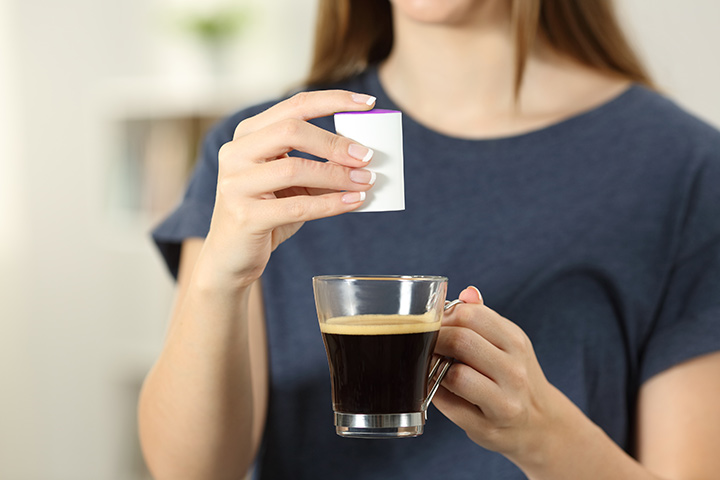
Stevia Sucralose Aspartame and Sunette are safe for pregnant women. Consumption of sugar and alternative low- or no-energy sweeteners has increased in recent decades.

If you use artificial sweeteners and are pregnant it is always best to talk with your care provider on which sweetener you are using and how much you are consuming.
Pregnancy and artificial sweetners. Yes most pregnant women can safely use any artificial sweeteners approved by the US. Food and Drug Administration FDA. Artificial sweeteners are calorie-free or nearly calorie-free additives that are used in foods and beverages to make them taste sweet.
They also come in packets so you can add them to food and drinks yourself. Most artificial sweeteners were found to be safe to use during pregnancy except for acesulfame potassium and saccharine. Acesulfame potassium has been found to cross the placenta into the babys system.
The substance is in many dental and pharmaceutical products. If you use artificial sweeteners and are pregnant it is always best to talk with your care provider on which sweetener you are using and how much you are consuming. Aspartame is the artificial sweetener found in NutraSweet Equal and most diet soft drinks and other sugar-free treats and its considered safe when consumed in moderate amounts.
Saccharin on the other hand is more. Stevia Sucralose Aspartame and Sunette are safe for pregnant women. Saccharin the sweetener in Sweet N Low is under study for safety for pregnancy.
Artificial sweeteners do not metabolize in the body and dont provide excess calories. Using artificial sweeteners can cause diabetic ketoacidosis in Diabetes Type 1 pregnant women. Artificial sweeteners that are approved by the FDA are safe during pregnancy.
That said some women may experience certain side effects after consuming them. Sugar substitutes or artificial sweeteners consist of chemical compounds instead of natural sugar which can increase hunger. Coconut sugar a natural sweetener is safe during pregnancy as a sugar substitute.
Its also called coconut palm sugar and looks a lot like brown sugar with small lumps. Today coconut sugar is recognized as a healthier and natural alternative to refined sugar sucrose high-fructose corn syrup and artificial sweeteners. Findings suggested that regular consumption of both artificial and natural sweeteners while pregnant increased body fat in offspring at weaning and body weight long-term.
When possible its best for pregnant women and children to avoid artificial sweeteners. If they are used they should be used in moderation. Its always important to weigh the overall health benefits when choosing foods and beverages.
Should You Avoid Artificial Sweeteners During Pregnancy. We have a lot of research and overall we do not see detrimental effects from non-nutritive sweeteners. There are some red flags showing concerns about gut microbiome health and the impact of non-nutritive or artificial sweeteners on future preferences for sweet foods.
The American Pregnancy Association also notes that stevia rebaudioside-A is okay for pregnant women. But though some of these artificial sweeteners have the green light from the FDA they should still be used sparingly. Artificial sweetener doesnt have vitamins and minerals so filling up on them could mean youre not getting the.
Although the safety of artificial sweeteners like aspartame and sucralose is a hot topic most doctors agree that these are safe during pregnancy when used in moderation although its always. The American Pregnancy Association recommends that women with gestational diabetes diabetes mellitus or insulin resistance should limit their exposure to nutritive sweeteners which include both table sugar and some sugar-free sweeteners known as sugar alcohols such as Sorbitol Xylitol Isomalt and Mannitol. Artificial Sweeteners Safe For Use During Pregnancy Sucralose Splenda.
It is a non-caloric sweetener made from sugar and approved by the FDA. It is approved for use in a variety of foods ranging from baked foods fruit juices baking mixes non-alcoholic beverages confectioneries coffee and tea products sauces syrups toppings and more. Consumption of sugar and alternative low- or no-energy sweeteners has increased in recent decades.
However it is still uncertain how consumption of sugar and alternative sweeteners during pregnancy affects pregnancy outcomes and long-term offspring health. Artificial sweeteners are considered safe during pregnancy when women stay well under the indicated Acceptable Daily Intake ADI which can be up to dozens of packets therefore most women will never come close to the ADI. There is a new study from JAMA-Peds that concludes that consumption of artificial sweeteners in pregnancy MAY increase risk of BMI of the infant.
It seems to be a nominal 02 change in BMI. As above moderation is still acceptable.